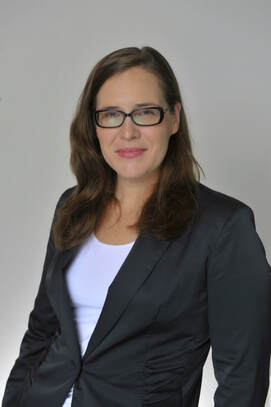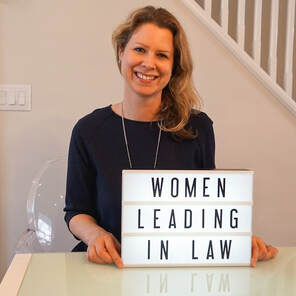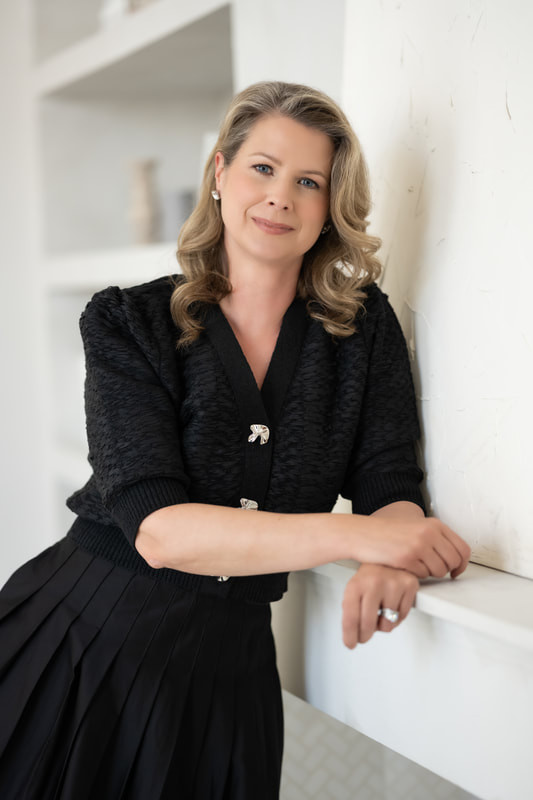 A reader wrote in and suggested that I profile this next leading lawyer, describing her as: "a wonderful supporter and mentor for women in law, particularly young women in law who obtained their law degrees out of Canada." I think that is a wonderful description. Meet Victoria Crewe-Nelson: 1. Tell me a little about your practice or business. I am very proud to say I’m part of the LAWPRO team that provides malpractice insurance to Ontario lawyers and law firms. Since 2018 I’ve been the VP Underwriting and Customer Service and the corporate secretary. Before joining LAWPRO in 2012 I was a lawyer in a mid-town Toronto firm. I liked to think of myself as an old-fashioned solicitor who had long-term clients who I got to help through their first home purchases, setting up their businesses, and acting on their estate matters. 2. Why did you go to law school? I wish I could say I went to law school to advocate for those who need it most, but that was the furthest thing from my mind. No, I went to law school to tick off a box and either go back into business or work for the government. When I was finishing my BA (in English and history) I went on a holiday to Scotland and fell in love with it. I came up with the plan that I’d go to law school in Scotland and after I graduated I would either stay in Europe or come back to Canada and resume my life as an office worker. But I was definitely not going to be a lawyer. As it turns out I did get into the University of Edinburgh and things started to change for me. I got excited about my studies. I began to enjoy the beauty of the law. I was cajoled into entering mooting competitions and wound up loving it. But even when I graduated I didn’t think I’d be a lawyer. After returning to Canada and working for a year, I applied with the National Committee of Accreditation to see what it would take to convert my Scottish law degree into a Canadian one. As it turns out, it was two years of law school. So I spent one year at the University of Ottawa, and one year at the University of Toronto. If someone had told me ahead of time that (i) I would actually want to be a lawyer; and (ii) that if I went to Scotland it would be onerous to qualify in Canada, would I still have gone to Edinburgh? No. And that’s a tragedy. What I gained from studying at Edinburgh had a big impact on me and I wouldn’t want to have lost that opportunity. 3. How did you get to where you are today? Design? Chance? Both? Chance played a large role in how I got to where I am. When I was at the University of Ottawa I was fired up to get my Masters in Tax Law and eventually teach. At the University of Toronto I got caught up in the idea of practising in big law and started applying for an articling position. I made a hash out of every articling interview I had. It didn’t help that I had no experience summering in law firms, but I also stink at networking so the rounds of cocktail parties were a nightmare for me. But one lawyer very kindly put me in touch with another lawyer he thought could benefit from an articling student. My principal was a fantastic lawyer and gentleman (William Sharpe) who taught me so many facets of what it takes to be a good lawyer. I was supposed to round out my articles with three months of practice with another firm, but I wound up staying at the second firm for almost ten years. I loved it. I loved developing relationships with my clients and knowing that they could count on me to make things better. I loved the interaction I had with the clerks and lawyers in the firm. I wanted to test myself and each time I came up with a clever solution and was recognized for it I felt like I was changing into the best version of myself. A lot of the best things about that experience were attributable to the woman I worked under for many years (Laura Legge). She showed me how to be strong, and empathetic; how to treat your staff and the clients who need help with the utmost respect; and how to be a great lawyer without sacrificing being a devoted partner and mother. After she died, I lost something. A big part of what I loved about going into the office every day was tied up with her, and I felt her loss every day. So I decided to make a break. But would it be setting up my own practice or going in-house? I went to a CPD where one of the speakers was from LAWPRO (Deborah Petch) and I liked her. What she had to say about her work at LAWPRO resonated with me. Shortly afterwards I saw an advertisement for a claims position. I told one of the partners I was applying for it, but I didn’t expect much to come from it. As it turns out, LAWPRO contacted me but suggested I try for a different position. I did and wound up in their underwriting department. Instead of managing claim files, I get to study what causes claims, and craft the E&O coverage that is fair to respond to these risks. I get to oversee our customer service centre and stay in touch with the realities of today’s practice environment. I somehow lucked out with the perfect job for me and each day I feel joy when I’m working. 4. What is your most significant achievement? What are you proud of? There are so many things I’ve valued about my time in private practice and now working at LAWPRO. Some of my fondest memories are the hand-written notes from clients telling me how I and my team helped them navigate a legal problem. I liked really talking with clients about what was going on, and knowing that they could go to any lawyer but they came back to me because they had confidence in what I could do for them. One thing I’m very proud of now is the excess professional liability program that LAWPRO has. I was the chief underwriter of it for many years and I loved watching it grow and respond to claims for those small law firms it is meant to protect. Outside of work, I’m proud of my family, which is made up of the widest range of personalities you could hope to meet. I enjoy my time on volunteer boards and doing movie marathons with my kids. I give thanks every day for the support shown to me by my husband that has allowed me to pursue my non-traditional path. 5. What are some key challenges, and more importantly, opportunities for women in law? Something that held me back at the start of my career was a lack of confidence in myself. I don’t remember any good answers I gave to interview questions, but I can remember every bad answer. When I went to court I focused on how I didn’t get a perfect result for my client, instead of celebrating a positive outcome. Having mentors demonstrate their belief in me did a lot to help me overcome this. Watching other women in law who would marvel at how well they did at things (even when I knew I would have been devastated with the same result) helped me realize that my expectations were too high. As someone who hates networking, it was a challenge for me (and to be honest, it still is). But it’s an important skill to have. Pro tip: go in well prepared. If you want to share information with someone, prepare a summary ahead of time so you know what points to tick off. If you’re terrified of long silences, have three go-to anecdotes you can share that will break the ice. Remember to ask questions and show the other person you’re interested. And be authentic – as uncomfortable as you feel in some situations, don’t try to come across as someone other than yourself because people will always know. When I was in practice, I saw the benefit of letting clients talk out their issues. I’d sometimes see others try to rush them through, but by letting them get it all out it made communicating easier from that point forward, and you knew some of the weight had come off their shoulders. I think a lot of women have an advantage in that regard, and can show empathy in the workplace and gain valuable insight into what their clients really need. The client who feels heard and who you communicate well with is less likely to blame you if things go wrong, less likely to sue you, and can be your greatest source of referrals. 6. What advice would you give a woman starting her legal career? If I was starting my career all over, I would hope to know the value of a good mentor. Or a lot of good mentors. People who are already established in their careers can be surprisingly easy to talk to and bounce ideas off. What puts off a new connection is if they think you’re trying to sell them something or have them get you a job. Maybe down the road that’s okay, but when first meeting someone, it should be about sharing ideas and advice and building a relationship. You can find wonderful mentors in the workplace, universities, from volunteer activities, and in your broader social circles. Or you can try the Law Society’s Coach and Advisor Network to get you started. Not enough women stay in private practice in the long term. There are a lot of reasons for this, but I have to say I really respect all those women who stay in firms and carve out balanced lives. We have to move away from judging each other (the eye rolls when someone leaves at 5:00, the “I don’t know how you do it” that hints that your family is suffering because of the long hours you put in). Women have so much to offer and shouldn’t feel uncomfortable in any workplace if they’re working hard and doing their best to have a balanced life. My closing advice is strike your own path and do things your way. You’ll like your job so much more if you make it uniquely your own. And I can’t say enough about approaching work with a “can-do” attitude. Seeing the opportunities every day, instead of the obstacles, makes work more fun for both you and the people you work with. ------------------------------------------------------------------------------------------------------------ Thank you Victoria for sharing your wisdom with us. (And I agree, I dislike hearing the "I don't know how you do it" comment. No one ever says that to my husband who is also juggling family/work/life. The underlying assumption and judgment aimed at women is aggravating.) I started this blog series because I was tired of hearing about women leaving law and wanted to hear about women leading in law. The "Women Leading in Law" series focuses on good news stories and highlights amazing women succeeding in the legal profession. Each post includes the profiled lawyer's answers to six questions. Prepare to be inspired! ICYMI - previous posts profiled the following amazing lawyers: Lynne Vicars, Kemi Oduwole, Anne-Marie McElroy, Jennifer Gold, Jordana Goldlist, Megan Keenberg, Yadesha Satheaswaran, France Mahon, Sarah Molyneaux, Richa Sandill, Vivene Salmon, Kim Whaley, Alisia Grenville, Frances Wood, Maggie Wente, Anita Szigeti, Neha Chugh, Christy Allen & Nancy Houle, Suzie Seo, Kim Gale, Alexi Wood, Melissa McBain, Erin Best, Gillian Hnatiw, Melanie Sharman Rowand, Meg Chinelo Egbunonu, Lisa Jean Helps, Nathalie Godbout Q.C., Laurie Livingstone, Renatta Austin, Janis Criger, May Cheng, Nicole Chrolavicius, Charlene Theodore, Dyanoosh Youssefi, Shannon Salter, Bindu Cudjoe, Elliot Spears, Jessica Prince, Anu K. Sandhu, Claire Hatcher, Esi Codjoe, Kate Dewhirst, Jennifer Taylor, Rebecca Durcan, Atrisha Lewis, Vandana Sood, Kathryn Manning, Kim Hawkins, Kyla Lee, and Eva Chan.
2 Comments
Marie Abraham
5/20/2020 04:43:17 pm
Thank you for publishing Tori's article. Even though I was called in 1996, I found her story and details interesting.
Reply
Erin
5/26/2020 07:40:05 am
Thank you for taking the time to comment Marie and I am glad you enjoyed the article. I am sorry to hear that you had to leave private practice. Too many people think we've reached equal standing as women in law but clearly we still have a far way to go.
Reply
Your comment will be posted after it is approved.
Leave a Reply. |
Erin C. Cowling is a former freelance lawyer, entrepreneur, business and career consultant, speaker, writer and CEO and Founder of Flex Legal Network Inc., a network of freelance lawyers.
Categories
All
Archives
December 2022
|
|
(C) 2014-2024 Cowling Legal. All rights reserved.
|
Please note I am not currently practicing law.
Information on this website does not constitute legal advice and is for informational purposes only. Accessing or using this website does not create a solicitor-client relationship. See website Terms of Use/Privacy Policy. info@cowlinglegal.com
3080 Yonge Street, Suite 6060 Toronto,ON M4N 3N1 (appointment only) |







 RSS Feed
RSS Feed
